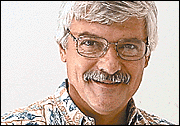


Capitol View
IT is nasty business, this festering relationship between the City Council and Mayor Jeremy Harris. Mayor, City Council
duke it outThis week the Council changes leadership and, for the second time in as many years, one of the reasons given for the abrupt change is to smooth relations between the Council and the mayor.
The competition between the twin powers isn't new. No city ordinance requires cooperation.
Because of the strange set-up -- designed to give the Council and the mayor nearly equal power -- the two are destined to quarrel.
For decades, Mayor Frank Fasi and the Council defined themselves not by accomplishments but by the fight of the month.
Usually the quibbling was over power, not issues or just positions on issues.
The actual times the Council and the mayor disagreed over the real future of Honolulu amount to no more than a bump, compared with the mountain of fights on personality. At times the Council and the mayor sounded like a grown-up version of children's backseat squabbles: "You didn't say please," "That's my ball," "She spit on me," or "I put my hand there first."
Sometimes it produces beneficial results or halts a stupid government plan, but most of the time it serves as an amusing distraction and a cautionary tale about the inadvisability of public service.
The difference with the latest dust-up is in the depth of the factions that have developed on the nine-member, nonpartisan group.
When Mufi Hannemann lost the chairmanship, he maintained that Mayor Harris was behind it. While Harris denied actually tallying up the votes to knock off Hannemann, he didn't want Hannemann's version of the city budget, with its drastic cuts, approved.
With so many circling opportunists, it is easy to line up five random Council members and make a majority for the monthly purge.
All nine are active in politics and ambitious. They are, however, counting down to the end of their Council terms. The new rules forbid the present Council from running for re-election when their terms expire, so they all need new political jobs.
The duties of the city government are more about making sure the police department is working well, the parks are open and clean, and people are obeying the building code; while mainland cities run welfare departments, school systems, airports and harbors. The challenges for inspiring leadership are few.
COUNCIL members trying to jump from the municipal level to a higher ranking find that while the Council provides an opportunity for year-round service, it doesn't focus the public on dynamic leadership or capture the imagination.
This new edition will also have to watch the public perception of its leader, Jon Yoshimura. As an attorney he has been hired as community affairs director for Channel 2 television.
He is also a lobbyist at the state Legislature, not for the city but for a law firm representing a company that wants to put an underground parking garage at Irwin Park at Aloha Tower.
At the time he was hired, Hannemann accused Yoshimura of a conflict of interest.
Yoshimura denied the charge, but the case is just one more example of the testy nature of the Council colleagues.
How the public benefits from all the power shifts has yet to be explained.
Richard Borreca reports on Hawaii's politics every Wednesday.
He can be reached by e-mail at rborreca@pixi.com